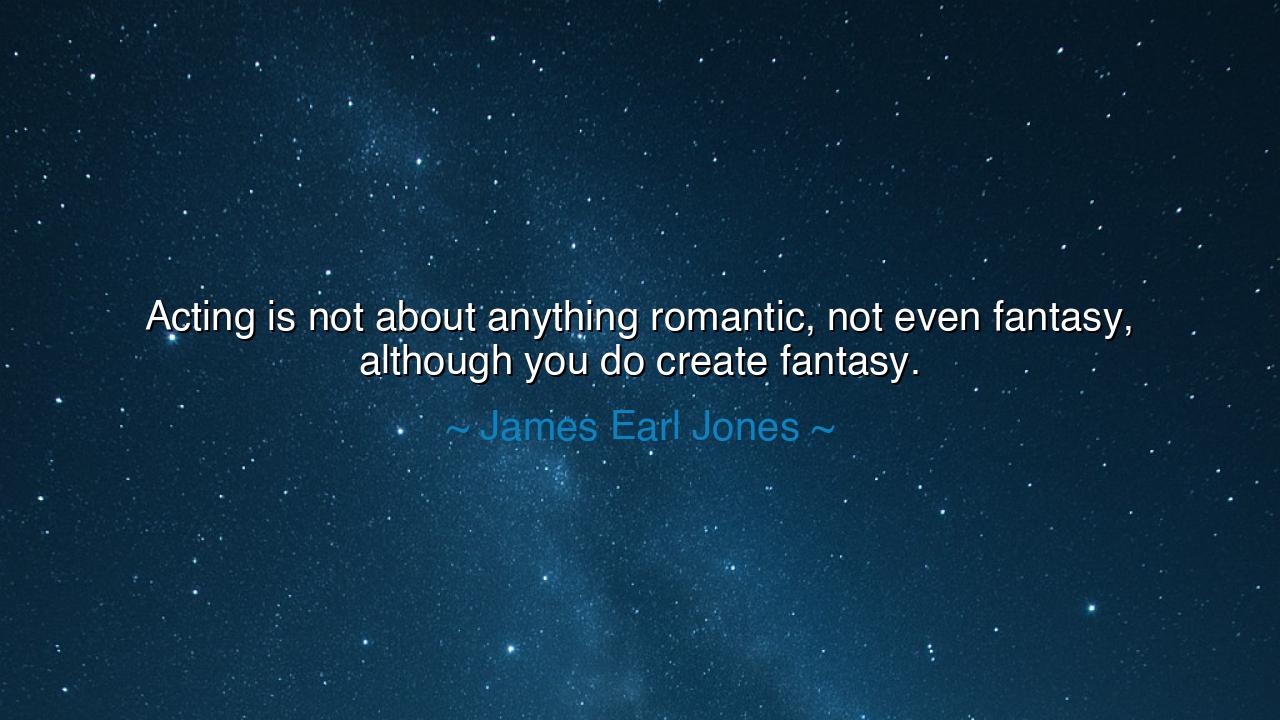
Acting is not about anything romantic, not even fantasy, although
Acting is not about anything romantic, not even fantasy, although you do create fantasy.






"Acting is not about anything romantic, not even fantasy, although you do create fantasy." – James Earl Jones. In these words, Jones distills the essence of acting as a craft—a discipline that transcends the superficial allure of romance and fantasy. Acting, he suggests, is not simply the playing out of imagined worlds or dramatic love stories, but rather a deeper, more profound exploration of the human condition. It is an art that demands the ability to transform, to live truthfully in the moment, and to bring life to characters not merely through outward performance, but by connecting with the core of what it means to be human. In this, acting becomes a mirror not just of imagination, but of truth and humanity itself.
In the ancient world, performance and storytelling were revered as vehicles for conveying the truths of life, even though these truths were often dressed in myth and legend. Sophocles and Aeschylus, the playwrights of ancient Greece, created characters that embodied not only their personal struggles but the collective fate of humankind. Their tragedies were not about romanticized figures of fantasy, but about the real emotions—hubris, suffering, guilt, and **redemption—that define the human journey. Acting, in this tradition, was not about creating a fairytale or a romanticized world, but about embodying realness within a larger context of mythic truth.
The idea of acting as truth echoes in the teachings of Aristotle, who wrote about the cathartic power of drama in his work Poetics. According to Aristotle, drama and acting allow audiences to witness the universal experiences of human life, from joy to tragedy, and to see these experiences in a way that purges or heals the soul. To act, then, is not to hide behind a veil of fantasy or romance, but to show the true nature of humanity in its varied forms. It is through this authentic portrayal that the actor can bring the audience closer to an understanding of themselves.
Take, for instance, the life of Laurence Olivier, the great English actor who was celebrated not for his fantasy roles, but for his deep commitment to authenticity in performance. His portrayal of Shakespeare’s Hamlet is a powerful example of acting that goes beyond the romantic and fantastical. Olivier did not simply play a character of high status, but embodied the inner turmoil, the existential questions, and the emotional depths that the character represented. His performance was not about fantasy, but about the painful reality of the human condition, the moral struggle, and the uncertainty that defines us all.
The lesson Jones imparts is a powerful one for all who seek to understand acting or life itself. Whether on stage, in film, or in our daily lives, it is not enough to merely play out a role or adopt a persona for show—true performance, and indeed, true living, comes from the honesty with which we confront ourselves and the world. When we act with integrity, we tap into a deeper truth that transcends the superficial nature of fantasy and romance. The finest actors are those who do not escape reality but embrace it fully, using their craft to illuminate the complexities of the human spirit.
This wisdom calls us to reflect on our own performances in life. Like actors, we often play roles—whether as friends, family members, or colleagues—and it is in these roles that we are called to live authentically. The fantasy of who we wish to be, or who others wish us to be, can sometimes cloud our true selves. But if we approach life with the same dedication that an actor like James Earl Jones brings to his craft—seeking truth, embracing complexity, and confronting our fears and vulnerabilities—we will not only perform our roles more genuinely, but will also lead richer, more fulfilling lives.
Let us then approach our lives with the honesty of the actor, not content to merely play out the roles assigned to us, but seeking to embody the truth of who we are. In every interaction, in every moment, let us bring depth, integrity, and authenticity to our performance. Like the great tragedians of old, let us embrace the complexities of our existence—not to escape reality, but to understand it, and in doing so, find meaning not just in the roles we play, but in the human experience itself. Through this, we will find that the most profound fantasies are those grounded in truth, and the most meaningful romances are those that are real.






AAdministratorAdministrator
Welcome, honored guests. Please leave a comment, we will respond soon